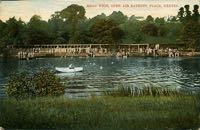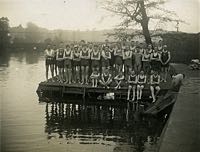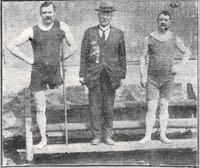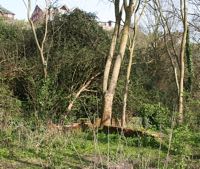
Head Weir Bathing Place
Page added 21st June 2015
Just above Head Weir, there was a bathing place that was used from the early nineteenth-century, or before. Bathing was unregulated at that time and drownings regularly occurred. At a dinner in June 1859, Charles Pates spoke about the dangers of the bathing in the river at Head Weir, which was reported in the Exeter and Plymouth Gazette.
"At the dinner given to Mr. Charles Pates, on Wednesday evening, that gentleman strikingly illustrated the necessity of precautionary steps being taken against the loss of fife which annually occurs at the Bathing Place, at Head Weir. Strange to say, about the very time he was striving to impress the importance of this subject on his hearers, another life was lost ; making two victims, during the short space of ten days, to the culpable negligence of the authorities of Exeter. Reason and humanity alike suggest that bathing should be altogether prohibited in this very dangerous part of the river, or that proper means should be taken to rescue incautious individuals from a watery grave."
The City Council took responsibility for the bathing place from 1864 when they appointed James Baker as the first bathing ground superintendent at a cost of 18s per week. It was situated on land rented from the London and South Western Railway, but formerly it was "Mr Carew's old withey bed" - a withey bed was where willow was grown for coppicing.
In 1871, Baker was sacked for misconduct and Frank Shooter, 'Hero of the Exe' appointed as the superintendent; in the same year the area was tarmacked. Later improvements to the bathing ground were made, with wooden slats for bathers to stand on after they left the water, pans of clean water for washing feet, and in 1877, fifteen bathing huts, at a cost of £56.
During September of 1872 a swimming match was run, that would became an annual event. By 1883, 80 guineas was offered in prizes. Shooter won a Silver Medal for Bravery, and was feted by the City Council, when he saved a young boy who fell into the river above Head Weir and was swept into the upper leat. The leat by this time was covered, so Shooter had to swim along a dark tunnel until he found the boy, to emerge in the open just below Engine Bridge.
In August 1895 the landlord of the Swan Inn in St Thomas applied for a license to sell liquors at the Annual Swimming matches at Head Weir, which was granted. By 1899, the inadequacy of the bathing area for swimming matches was apparent, especially for public access to watch, that permission was granted to use the canal basin. This and the opening of the Tepid Baths in 1893 saw a reduction in the use of the bathing place. In 1917, the City Council appointed A L Matthew, who succeeded John 'Tich' Bates who had been in place from 1906. Frank Shooter had retired, after 37 years, as the superintendent. Matthews was famous as one of the fastest swimming sprinters in Devon, and for having one leg. The bathing area was still in use in 1940, opening on 29 April, and manned by a resident superintenden. In June of 1940, it was recommended that military personnel could swim at the Head Weir bathing place for free. There is no record of continued use after that year.
Sources: Exeter and Plymouth Gazette on the British Library Newspaper Archive.
│ Top of Page │



